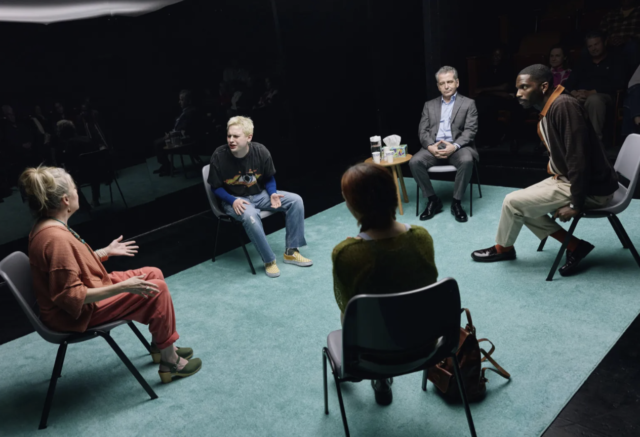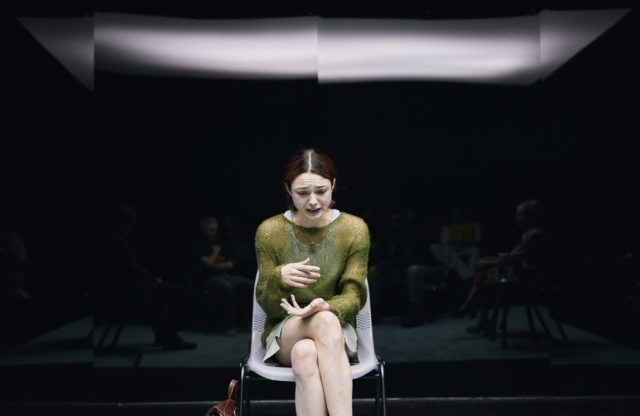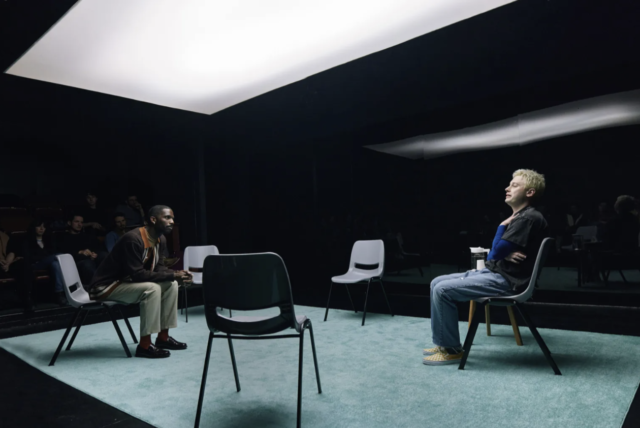
A family deals with a suicidal prodigal son in The Animal Kingdom (photo by Emilio Madrid)
THE ANIMAL KINGDOM
Connelly Theater Upstairs
220 East Fourth St. between Aves. A & B
Tuesday – Sunday through February 17, $52.24-$83.74
www.animalkingdomplay.com
www.connellytheater.org
There is an internet meme that you can get on a T-shirt, mug, poster, or notebook: “Theater is therapy for the soul.” In the past few years, I’ve seen a handful of plays that take the quote extremely seriously: The entire show is set within the confines of a therapy session (or sessions).
In Dave Malloy’s Octet, eight people gather to face their obsessions with technology. In Emma Sheanshang’s The Fears, seven Buddhists share their traumas. In Those Guilty Creatures’ The Voices in Your Head, the audience sits in a large oval among actors portraying characters dealing with grief. And in Max Wolf Friedlich’s Job, a therapist has the responsibility of determining whether an employee who suffered a public meltdown is ready to return to work.
In each of those cases, we do not see anything outside the session(s). The same is true of Ruby Thomas’s gripping but mystifying The Animal Kingdom, which continues through February 10 at the Connelly Theater Upstairs; downstairs is an encore run of Job.
An audience of no more than fifty sits on three sides of Wilson Chin’s tiny stage at a recovery center, consisting of five equally spaced plastic chairs in a circle on a green rug along with a small table with water, cups, and tissues. The far wall is a two-way mirror where experts can watch the proceedings — and we can see reflections of ourselves or other audience members, as if we’re part of the group. Above is a large rectangular light box that changes colors during scene changes to try to maintain a calming mood, accompanied by transitional music. (The lighting is by Stacey Derosier, with sound by Christopher Darbassie and contemporary costumes by Ricky Reynoso.) Otherwise, it is threateningly quiet; it never goes dark, so you can see and hear people scratch their leg, shift in their seat, or reach into their bag for a cough drop.

Sofia (Lily McInerny) doesn’t hold back in New York premiere of British play (photo by Emilio Madrid)
The patient is Sam (Uly Schlesinger), a college student who has recently tried to kill himself. His parents are divorced and not on friendly terms; Rita (Tasha Lawrence) is an overbearing yapper, and Tim (David Cromer) is a reticent businessman who would rather be anywhere else but there, nervously shaking one leg, speaking only when practically forced to. Tim’s younger sister, eighteen-year-old Sofia (Lily McInerny), has been essentially ignored by her parents for years while they deal with Tim. Facilitating the sessions is Daniel (Calvin Leon Smith), who is almost impossibly gentle and serene, especially when things heat up among the family members.
The details of the family’s dysfunction emerge from confessions, admissions, and accusations as we learn more about each person, some of which is almost too metaphorical. Tim runs a turnaround fund where he buys failing businesses and makes them profitable but has no idea how to turn around the pain his wife and kids are feeling. Rita is a doula who helps pregnant mothers but doesn’t understand her own children. Sam is obsessed with swifts, aerial birds that are unable to stand properly because of their small legs and whose migratory patterns are in chaos because of climate change, much like Sam’s life path has been disrupted by his mental health issues. And when Rita complains, “It’s a bit lonely in the house. Empty nest,” Sofia scoffs, “I still live there.”
Over the course of six sessions, they argue about abandonment, medication, education, sex drives, and the difference between gay and queer. Daniel offers such obvious guidance as “I know this might not always be easy. We might have to say difficult things, hear difficult things. But in my experience the family system, as we call it, is such an important one.”
During the first scene, I dreaded being stuck in this room for eighty minutes of therapeutic healing, but director Jack Serio, who previously helmed an intimate adaptation of Uncle Vanya in a Flatiron loft and This Beautiful Future at the Cherry Lane, keeps us engaged as characters change chairs for each meeting, giving the audience a different perspective on the family members and the therapist as they go through major, or minor, transformations of some kind.

Therapist Daniel (Calvin Leon Smith) tries to get to the root of Sam’s (Uly Schlesinger) issues in The Animal Kingdom (photo by Emilio Madrid)
The cast is excellent, beginning with Schlesinger, who made his New York stage debut in This Beautiful Future in 2022. The tortured Sam is wound up tight at the start, a ticking time bomb, but it’s McInerny who explodes as Sofia, who has had enough. Cromer, who played the title character in Serio’s Uncle Vanya and directed McInerny in Bess Wohl’s Camp Siegfried, portrays Tim with a calm control, while Lawrence regales with Rita’s inability to just shut up.
Obie winner Smith could not be more easygoing as Daniel, although I hope they change a line, one of the only jokes in the show: Expressing hopefulness amid his nerves, he says, “And the Knicks are playing later and it hasn’t been the best season. Or the best decade,” as if hope might be unattainable. Right now the Knicks are having their best season in years, so it would be better if they changed it to the Jets or another perennial punching bag sports team, at least while the play is in New York City. The British Thomas (Either, Linck & Mülhahn) might not be up on her hoops, but Daniel should be.
Some have made the case that The Animal Kingdom is not in fact a play but merely an exercise in fictional group therapy, taking advantage of a currently popular theatrical device. However, I would argue that in its character development, narrative flow, and unique staging, it is a poignant drama about a complicated family finally having to look at itself in the mirror and admitting they might not like what they see.
[Mark Rifkin is a Brooklyn-born, Manhattan-based writer and editor; you can follow him on Substack here.]